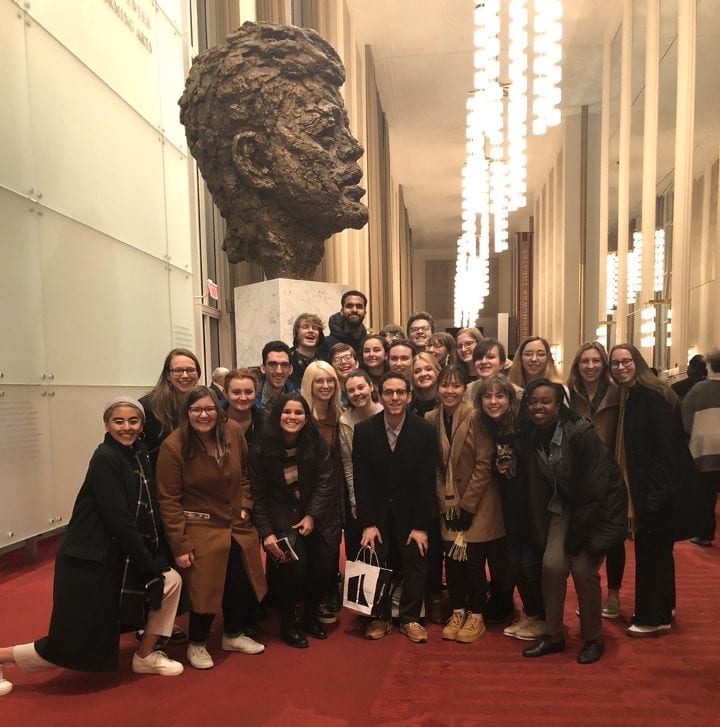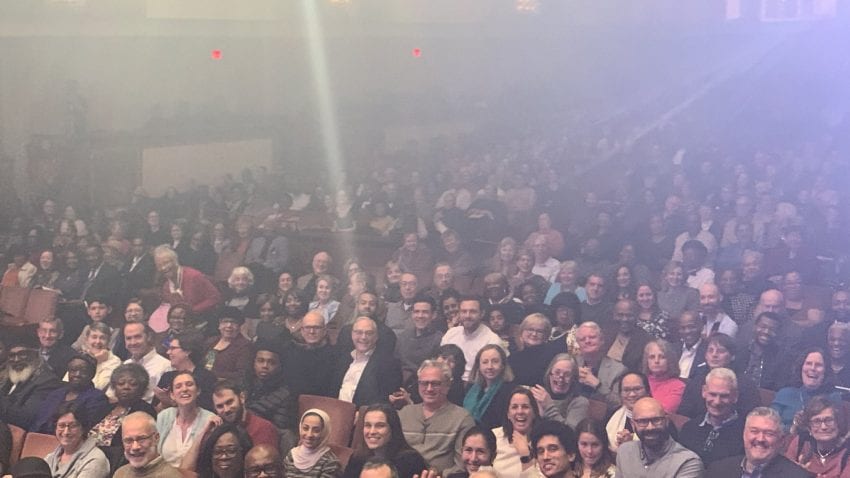
Washington Performing Arts Men, Women, and Children of the Gospel Choirs (read this blog post I previously wrote to learn more about this incredible organization) and The Choral Arts Society of Washington joined hands and voices for the annual choral tribute to Dr. Martin Luther King, Jr. at the Kennedy Center (read Sam’s blog post about another of the Kennedy Center performances we attended). Tears came to my eyes as the choir sang “Give Me Jesus,” and the ASL interpreters contributed to the beauty of that evening. From that moment, I knew this performance would be different from any other our class has experienced this month. There were several concepts that set this performance apart from others we saw. Firstly, the concert was entirely comprised of gospel music, and the music emanated community and history. The performers were illuminated from participating in the music, and there was a clear camaraderie that was created in the audience thanks to the performers’ passion. This atmosphere set the stage for the audience to be able to participate in the music without constraint, as they stood up and cheered, swayed, raised a hand, or called out an “amen.” But what may stand out to me the most from our time at Living the Dream… Singing the Dream was the content of the speakers that evening. Here are my key takeaways…
The event was federally funded, yet uncensored.
Speakers freely spoke to the current political climate. During her presentation of the 2020 Humanitarian Award, Marian Wright Edelman stated that, “I don’t want my children and grandchildren to have to go back to the 1950s and 60s and relive these struggles and inequalities all over again.” Sherrilyn Ifill, the 2020 Humanitarian Award Recipient, said, “It wasn’t money that allowed [civil rights lawyers] to break the back of Jim Crowe, it wasn’t their privilege, they didn’t have a blueprint to follow. They decided they’d create the blueprint and hold this country to its word, all while being victims of the very inequality they strived to dissolve.” Her freedom in calling out the faults of the federal government isn’t something we’ve frequently encountered during our time here in DC. It is even more remarkable that this speech was given in a space and with organizations that are funded, in large part, by federal dollars.
It was encouraging and unifying.
While Ifill did not shy away from addressing the political climate that the US is experiencing, she didn’t stop with condemning our current state. She said, “To all those who are discouraged, I want to ask you to stop it. Reach inside yourself and summon courage to build the world that your great-grandchildren will live in. Today’s democracy is a reflection of the work undone from years before, not the work done.” Dr. Martin Luther King, Jr., for whom the event was dedicated, made frequent references throughout his sermons and speeches to one of his favorite gospels, “We Shall Overcome.” The lyrics state, “We shall overcome, someday.” Ifill said, “That ‘someday’ is our hope. Do the work of someday.” If you’d like to read more of Ifill’s thoughts on current events, she wrote a powerful article for The Washington Post: It’s Time to Face The Facts: Racism is a National Security Issue. She also has a killer Twitter game, where I found this selfie that she took with all of us in the audience from the stage that night…

The night spoke candidly about democracy and the arts.
Unlike a traditional format of a concert that might be held at the Kennedy Center, the conductors of the gospel choirs took turns speaking and introducing pieces. Michele Fowlin, Artistic Director of Children of the Gospel Choir, spoke to the wide-reaching influence of African American music on national and international music. She said that African American music isn’t a fixed idea–it has a range, and it has a reach into just about any genre: blues, jazz, symphonies, and the list goes on. She spoke to the history of African American music that is all too often forgotten in the study music history. Ifill said, “We don’t do art because it makes us better at math; we do art because it joins us together and makes us ready for the fight ahead.” For Ifill, art fuels her to continue the work toward forming the democracy that our grandchildren and great-grandchildren will live in.
